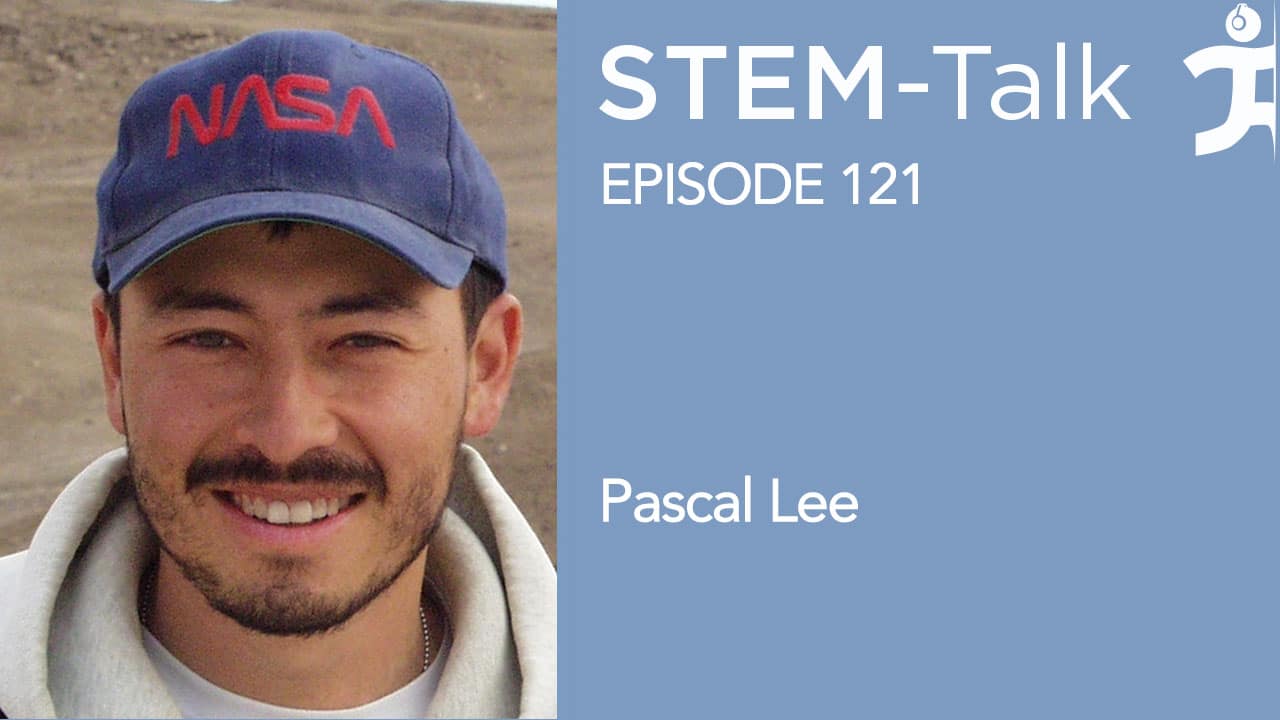STEM-Talk
Episode 121: Pascal Lee on the Mars mission and our search for alien life in the galaxy
// Apr 14, 2021

It has been nearly a month since NASA’s Perseverance rover landed on Mars. So far, the rover hasn’t detected any signs of past life on the planet. But scientists have determined that several of the rocks on Mars are chemically similar to volcanic rocks on Earth. This, of course, has caused quite a bit of buzz. So, the double-secret-selection committee decided it was a perfect time to invite the chairman of the Mars Institute onto the show to get his take on the Perseverance and the Mars Mission so far.
Actually, this is Dr. Pascal Lee’s second appearance on STEM-Talk. Pascal is a planetary scientist and director of the NASA Haughton-Mars Project at NASA Ames Research Center who was our guest in 2016 on episode 17. Back then we talked to Pascal about his annual visits to the High Arctic’s Devon Island, which is the Earth’s largest uninhabited land that has geological characteristics similar to what scientists believe we will find on Mars.
Today we catch up with Pascal and his Haughton-Mars Project. We also talk to him about Perseverance and a host of other Mars-related topics.
We ask Pascal if he thinks we’ll find signs of life on Mars, or if he believes we will ever find signs of alien life in our galaxy. We also get Pascal’s thoughts about future manned missions to Mars and whether humans will ever colonize the Red Planet. And after listening to today’s interview, be sure to check out Pascal’s artwork and his recent paintings of Mars.
Show notes:
00:03:15 Dawn opens the interview welcoming Pascal back to STEM-Talk, mentioning that the last time he was on the podcast he was about to spend his 20th consecutive summer on Devon Island, the Earth’s largest uninhabited land with geological characteristics similar to what Pascal believes we will find on Mars. Dawn goes on to mention that due to COVID-19, last year’s trip to Devon Island was canceled and asks him about his disappointment.
00:05:11 Ken asks if Pascal is confident that he’ll return to Devon Island this coming summer.
00:05:36 Dawn mentions that it takes several stops and trips to reach Devon Island. She asks who makes those travel arrangements and how the journey plays out.
00:08:25 Ken asks about Pascal’s polar bear guard dog, Apollo, inquiring as the protocol when Apollo alerts the team about a nearby polar bear.
00:10:48 Dawn mentions the Webby Award-winning documentary filmed by a team at Google who came to visit Pascal on Devon Island in 2018 called “Mars on Earth: A Visit to Devon Island”. Dawn asks Pascal what he thought of the documentary.
00:12:20 Ken asks Pascal to elaborate on the space suit that he was planning to test on Devon Island last summer but couldn’t because the trip was canceled.
00:16:39 Dawn asks about the glove Pascal wants to test that may enable single-handed drone operation.
00:20:11 Dawn mentions that the atmosphere of Mars is around 60 times less dense than the Earth’s. She asks Pascal about the challenges of flying a drone on Mars.
00:22:15 Dawn asks Pascal to elaborate on his recommendation that scientists study the Inuit culture and history in relation to long-duration space travel.
00:26:01 Ken mentions NASA’s Perseverance rover, which landed on Mars in February and relates that Steve Jurczyk, the NASA acting administrator, described Perseverance’s landing on Mars as a pivotal moment for the United States and space exploration. Given that NASA has landed rovers on Mars before, Ken asks Pascal what makes this particular landing especially significant.
00:28:10 Dawn mentions that NASA recently released recordings of the Perseverance rover driving on the surface of Mars. Dawn goes on to ask what the particular significance is of the audios.
00:29:41 Dawn asks what NASA means when it describes Perseverance as a “robotic astrobiologist.”
00:32:36 Ken asks Pascal to discuss the Mars helicopter, Ingenuity, that made its flight to mars attached to the belly of Perseverance. Pascal describes some of the challenges NASA and its engineers face in attempting to produce powered flight on the surface of Mars.
00:41:06 Dawn mentions that Perseverance is just one of three Mars missions that are currently underway. She explains that The United Arab Emirates and China also have crafts that have reached Mars, with all three of these missions being launched in July of 2020. Dawn asks Pascal to explain what he knows about both of these missions.
00:43:56 Ken asks if Pascal knows what type of entry, decent, and landing method the Chinese mission is employing.
00:45:01 Ken asks Pascal to describe the leading theory regarding what happened to the water that may have once been on the surface of Mars. Pascal also explains his own theory on this topic.
00:51:15 Ken asks Pascal to describe how he would go about testing his theory regarding the water of ancient Mars if he were the NASA Administrator.
00:59:15 Dawn mentions Avi Loeb, who is a Harvard astrophysicist and author of the book, “Extraterrestrial: The First Sign of Intelligent Life Beyond Earth,” argues that aliens have already visited the Earth. Given recent news stories about the uptick of reports from Navy and Air Force pilots observing UFOs, Dawn asks Pascal if he believes we are alone in our galaxy.
01:09:54 Pascal gives his thoughts on what is behind all the UFO sightings often talked about in the media.
01:13:16 Dawn asks Pascal to elaborate on his thought that a manned mission to Mars will require a measured approach consisting of several milestones, including taking a round trip to Mars without landing.
01:18:57 Ken mentions that he agrees with Pascal’s perspective that Phobos and Deimos, the two moons of Mars, are a spectacular choice for human exploration.
01:22:14 Ken mentions that in addition to being a planetary scientist, Pascal is an accomplished artist. Ken asks if Pascal was able to get more painting done this year as a result of COVID-19.
01:23:18 Dawn asks Pascal to name some of his what some of his favorite pieces of artwork.
01:24:44 Dawn mentions that the last time Pascal was on STEM-Talk, Pascal got the chance to talk about his children’s book “Mission to Mars,” written in the hopes of inspiring children to take an interest in science and space travel. Dawn goes on to say that Pascal had also mention that he was working on a book for adults tentatively titled “From Earth to Mars.” Dawn asks how that book is coming.
01:25:17 Dawn closes the interview asking Pascal to elaborate on his thoughts that we are on the verge of a great age of the renewal of human exploration.
Links:






